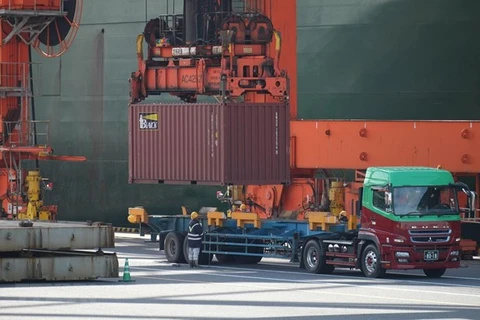Singapore (VNA) - The ASEAN+3 region will remain resilient in 2022 in face of new challenges from the COVID-19 pandemic and the global economy, according to the ASEAN+3 Macroeconomic Research Office (AMRO).
In its quarterly update of the ASEAN+3 Regional Economic Outlook released on January 25, AMRO maintains a positive outlook on ASEAN+3 economies (comprised of the 10 ASEAN countries plus China, the Republic of Korea, and Japan) for this year, with regional GDP growth of 4.9 percent, lower than the projection of 5 percent in the October update. Meanwhile, inflation will be kept relatively low at 2.9 percent for 2022.
The thinktank pointed out that the emergence of the Omicron variant towards the end of 2021 brought new uncertainties and set back the progress of economic reopening. Nevertheless, high vaccination coverage has mitigated the risk of nationwide lockdowns, as experienced during the early days of the pandemic.
“The ASEAN+3 region has sufficient policy space to navigate through these new challenges, and stay on its recovery path,” said AMRO’s Chief Economist, Dr. Hoe Ee Khor.
The 2022 growth forecasts for most ASEAN economies have been revised downward as the spread of the highly transmissible Omicron at the beginning of the year necessitated the re-imposition of containment measures.
Meanwhile, AMRO estimated the 2021 economic growth in the ASEAN+3 region at 5.9 percent, down by 0.2 percentage point from last October’s forecast. The revision was driven by weaker-than-expected growth in Japan, where economic activity in the third quarter was significantly curtailed with the resurgence of infections across the country, and in China, due to the softening of the property market as a result of stricter measures on leverage of property developers./.
In its quarterly update of the ASEAN+3 Regional Economic Outlook released on January 25, AMRO maintains a positive outlook on ASEAN+3 economies (comprised of the 10 ASEAN countries plus China, the Republic of Korea, and Japan) for this year, with regional GDP growth of 4.9 percent, lower than the projection of 5 percent in the October update. Meanwhile, inflation will be kept relatively low at 2.9 percent for 2022.
The thinktank pointed out that the emergence of the Omicron variant towards the end of 2021 brought new uncertainties and set back the progress of economic reopening. Nevertheless, high vaccination coverage has mitigated the risk of nationwide lockdowns, as experienced during the early days of the pandemic.
“The ASEAN+3 region has sufficient policy space to navigate through these new challenges, and stay on its recovery path,” said AMRO’s Chief Economist, Dr. Hoe Ee Khor.
The 2022 growth forecasts for most ASEAN economies have been revised downward as the spread of the highly transmissible Omicron at the beginning of the year necessitated the re-imposition of containment measures.
Meanwhile, AMRO estimated the 2021 economic growth in the ASEAN+3 region at 5.9 percent, down by 0.2 percentage point from last October’s forecast. The revision was driven by weaker-than-expected growth in Japan, where economic activity in the third quarter was significantly curtailed with the resurgence of infections across the country, and in China, due to the softening of the property market as a result of stricter measures on leverage of property developers./.
VNA

























